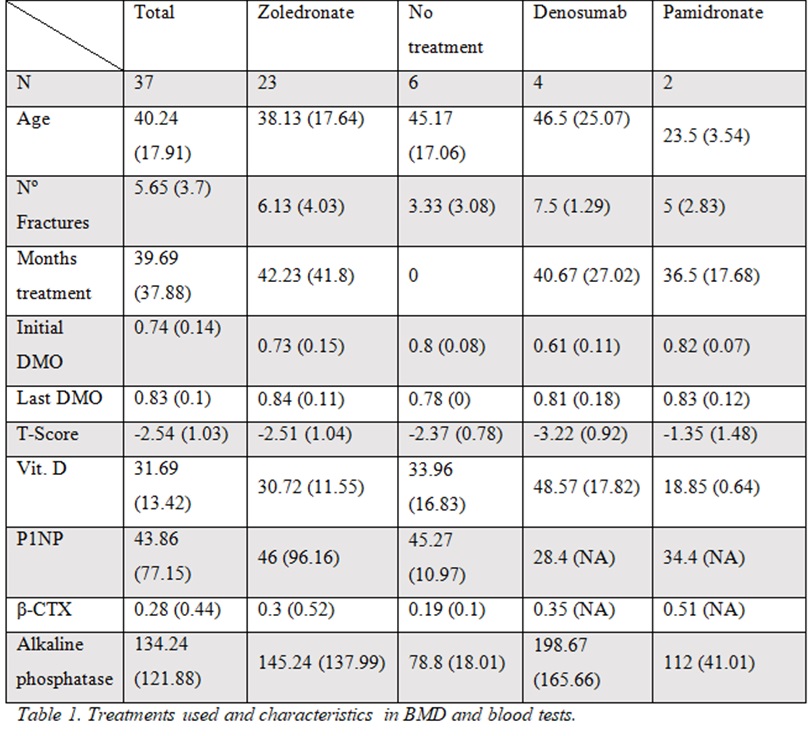Session Information
Date: Monday, November 18, 2024
Title: Osteoporosis & Metabolic Bone Disease – Basic & Clinical Science Poster
Session Type: Poster Session C
Session Time: 10:30AM-12:30PM
Background/Purpose: Osteogenesis imperfecta (OI) is a hereditary connective tissue disorder (90% autosomal dominant) characterized by a disruption in type 1 collagen or proteins associated with it. Individuals with OI face an increased risk of fractures due to the lower bone mineral density they exhibit, along with other systemic manifestations.
Currently, there is no specific treatment available for these patients, who necessitate a multidisciplinary approach and the use of anti-resorptive drugs in cases of moderate to severe forms with a high risk of new fractures.
Our aim is to describe clinical characteristics and evaluate bone metabolism in OI patients.
Methods: A retrospective observational study in OI patients was performed. OI diagnosis was established through genetic testing or family aggregation (confirmed index case and dominant inheritance).
Results: 37 OI patients were included (56.76% female) with a mean age of 40 (18) years. Genetic confirmation was present in 23 cases, and the most frequent OI subtypes were type I (5), Brück syndrome (2), type III (1), and type 5 (1). The most commonly affected genes were COL1A1 (45.83%) and COL1A2 (41.67%), with a dominant inheritance pattern observed in 92.86% of cases.
Fracture history was reported in 36 patients, with an average of 6 (4) fractures. Recorded fractures included 5 in the spine and 5 in the hip.
At the densitometry level, the mean BMD at basal visit was 0.74 g/cm² (0.14), compared to 0.83 g/cm² (0.1) in the latest recording, resulting in a delta of 0.08 (0.18). The mean T-Score for the total lumbar spine was -2.54 (1.03).
Blood test results showed mean values within the normal range for vitamin D (31.7 ± 13.4), PTH (34.8 ± 14.9), P1NP (43.9 ± 77.2), and β-CTX (0.3 ± 0.4). The alkaline phosphatase mean of 134.2 (121.9) was slightly elevated. Other values such as albumin, glomerular filtration rate, calcium, and phosphorus were within normal ranges.
Regarding therapy, 6 patients had not received treatment, 27 received bisphosphonates, and 4 received denosumab. Eleven patients underwent a single line of treatment, 15 underwent two lines, and 5 underwent three lines. Zoledronic acid was the most commonly used bisphosphonate (62.2%), while pamidronate was more prevalent (45.2%) as the initial treatment.
Conclusion: The OI patients exhibit typical mutations and inheritance patterns as described in the literature. Nearly all have a history of previous fractures and demonstrate BMD within the range of osteoporosis. The most commonly used treatments are bisphosphonates, being the predominant choices pamidronate in pediatric cases and zoledronic acid in adults.
To cite this abstract in AMA style:
Ramos Castro D, LEAL S, Grau García E, OLLER RODRIGUEZ J, Ivorra-Cortés J, Riesco Barcena C, Huaylla Quispe A, Muñoz Martínez P, Mas Sánchez L, Torrat noves A, Villanueva Mañés B, Alcántara Álvarez I, Pérez Hurtado A, Simeo Vinaixa M, Román-Ivorra J. Study of Bone Metabolism in Patients Diagnosed with Osteogenesis Imperfecta. [abstract]. Arthritis Rheumatol. 2024; 76 (suppl 9). https://acrabstracts.org/abstract/study-of-bone-metabolism-in-patients-diagnosed-with-osteogenesis-imperfecta/. Accessed .« Back to ACR Convergence 2024
ACR Meeting Abstracts - https://acrabstracts.org/abstract/study-of-bone-metabolism-in-patients-diagnosed-with-osteogenesis-imperfecta/

